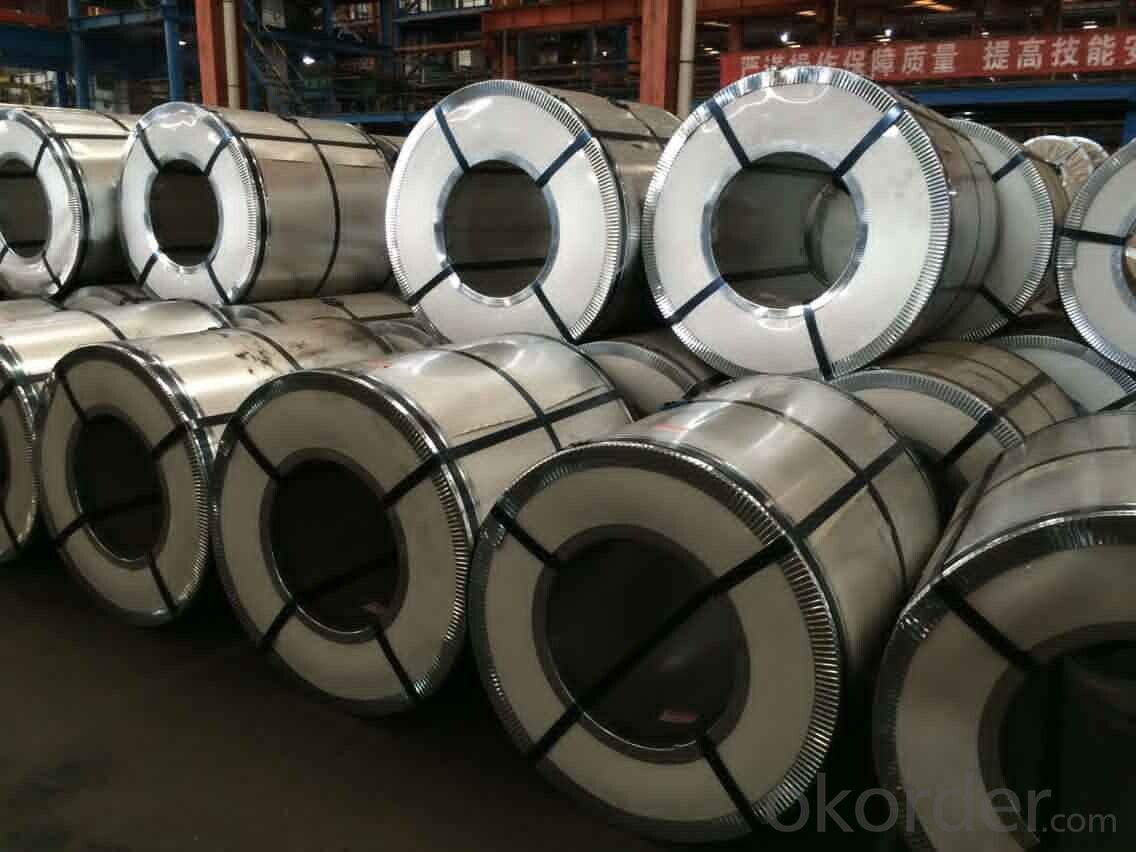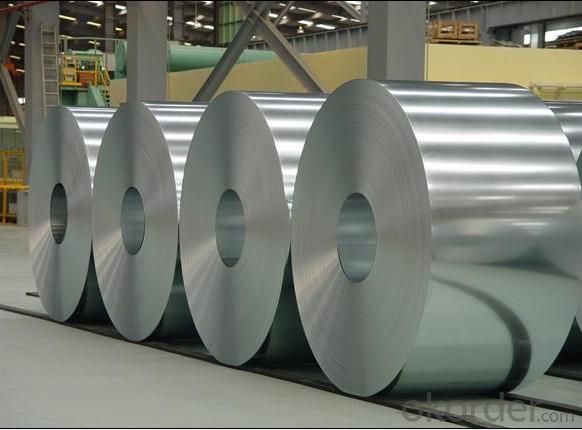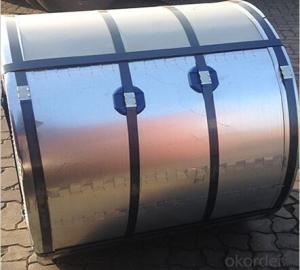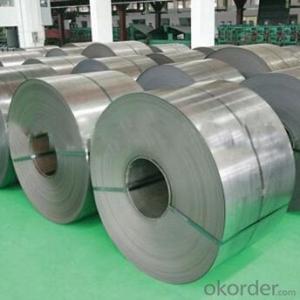Galvanized Corrugated Steel for Roofing
- Loading Port:
- Tianjin
- Payment Terms:
- TT OR LC
- Min Order Qty:
- 50 m.t.
- Supply Capability:
- 10000 m.t./month
OKorder Service Pledge
OKorder Financial Service
You Might Also Like
Product Details
Basic Info.
Model NO.:CUS-140527-K
Standard:ASTM, JIS, GB, AISI, DIN, BS
Steel Grade:Q235
Surface Treatment:Galvanized
Technique:Cold Rolled
Thickness:0.12-1.5mm
Zinc Coating:40-275G/M2
Surface Structure:Ero Spangle, Regular Spangle or Normal Spangle
Width:600-1250mm
Material:SGCC,Sgcd,Secc,Secd,Dx51d+Z
Export Markets:Global
Additional Info.
Packing:Export Packing
Standard:ISO9001/SGS/BV
Origin:Henan, China
HS Code:7210
Production Capacity:300000 Mt/Year
Product Description
Specifications:
1. Thickness: 0.12-1.5mm
2. Width: 600-1250mm
3. Material: SGCC, SGCD, SECC, SECD, DX51D+Z
4. Zinc coating: 40-275G/M2
5. Surface Structure: Galvanized, zero spangle, regular spangle or normal spangle
6. Surface treatment: Chromated and oiled, chromated and non-oiled
Main characteristics:
1. Strong corrosion resistance
2. Surface quality
3. Conducive to deep processing, such as corrugated steel sheet 4. Economy and practicality
Packing
Each bare coil to be securely tied with two bands through the eye of coil (or not) and one circumferential, the contact points of these bands on the coil edge to be protect with edge protectors. Coil then to be properly wrapped with water proof /resistant paper, it then to be properly and completely metal wrapped. And each packed coil to be properly wrapped with band, three-six such band through the eye of coil at about equal distance, and two-four such bands securely tied around belly of coil at about equal distance.
| Commodity | Hot dip galvanized steel coil and sheet |
| Techinical Standard: | JIS 3302 / ASTM A653 / EN10143 |
| Grade | DX51D / DX52D/ DX53D/ S250,280,320GD |
| Types: | Commercial / Drawing / Deep Drawing / Structural quality |
| Width | 500/650/726/820/914/1000/1200/1219/1220/1250mm |
| Thickness | 0.12-1.5mm (0.14-0.5mm is the most advantage thickness) |
| Type of coating: | galvanized |
| Zinc coating | Z60-275g/m2 |
| Surface treament | chromed / skinpass/ oiled/slightly oiled/ dry/ anti-fingerprint |
| Surface structure: | zero spangle / minimized spangle / regular spangle/ big spangle |
| ID coil | 508mm or 610mm |
| Coil weight | 3-8 MT per coil |
| Package: | Properly packed for ocean freight exportation in 20''containers |
| Application: | Industrial panels, roofing and siding for painting |
| Price terms | FOB,CFR,CIF |
| delivery time | 25 days after recepit of 30% TT |
| Remarks | Insurance is as requirements |
| MTC will be handed on with shipping documents | |
| We accept the third party certification test |


FAQ:
1. What is the minimum order quantity ?
Our MOQ is 50mt for each size. And we will consider to give more discount if you make big order like 1000 tons and more. Further more, the more appropriate payment term your offer the better price we can provide.
2. How long can we receive the product after purchase?
Usually within thirty working days after receiving buyer’s advance payment or LC. We will arrange the factory manufacturing as soon as possible. The cargo readiness usually takes 15-25 days, but the shipment will depend on the vessel situation.
3. How to guarantee the quality of the products?
We have established the international advanced quality management system,every link from raw material to final product we have strict quality test;We resolutely put an end to unqualified products flowing into the market. At the same time, we will provide necessary follow-up service assurance.
4.What is the validity of your quotation?
Normally 7 days.
5.What is your advantage?
24 hour quick response /Customer oriented/ Credit foremost/ Top quality Excellent
- Q:Want to construct a patio cover approx. 20 feet long. Only want to use a 6x6 or 8x8 post at each end. What size steel i-beam would I have to use to carry the load???
- Probably the reason some contractors don't like this idea is that your new built-up beam, being only 6 tall, is not going to allow the joists above to attach effectively. The triple microlam with steel plates is sooooooo overkill in strength, but doesn't have the height to allow the floor joists to proberly attach. Your span is not so great that a built-up beam wouldn't work great. Assuming that your second floor joists are 2 x 10, I would use 2- 2 x 10 with 1/2 plywood sandwiched between. This is all that you really need.
- Q:What are the dimensions of steel coils used in the storage tank industry?
- Steel coils used in the storage tank industry come in various dimensions, depending on the specific requirements of the tank being manufactured. Generally, these coils are available in different sizes and thicknesses. The width of the steel coils can range from approximately 600 millimeters to 2,400 millimeters. Similarly, the length can vary from a few meters to tens of meters. The thickness of the coils can also differ, typically ranging from 1.5 millimeters to 10 millimeters or more. Factors such as the size and capacity of the storage tank, the material being stored, and the structural requirements of the tank determine these dimensions. Consequently, the tank manufacturer or designer would determine the specific dimensions for a given storage tank project, following industry standards and project specifications.
- Q:Can steel coils be used in electrical applications?
- Certainly, electrical applications can make use of steel coils. In the realm of electrical circuits, steel coils often serve as magnetic cores in transformers and inductors, which are indispensable components. The steel employed in these coils typically consists of high-quality electrical steel, possessing distinct magnetic attributes, including low core losses and high permeability. These attributes empower the steel coils to efficiently transmit electrical energy between various circuit components. Furthermore, steel coils can also find utility in other electrical applications, such as the construction of electric motors and generators. Taking everything into account, steel coils are extensively employed in electrical applications due to their magnetic properties and their capacity to handle high currents and temperatures.
- Q:How are steel coils used in the production of food processing equipment?
- Steel coils are commonly used in the production of food processing equipment due to their various advantageous properties. These coils, typically made from stainless steel, are used in the manufacturing of a wide range of equipment such as mixers, blenders, conveyors, ovens, and fryers. One of the main reasons steel coils are used in food processing equipment is their excellent resistance to corrosion. Stainless steel coils are highly resistant to rust and can withstand exposure to moisture and various food substances without deteriorating. This is crucial in ensuring the equipment remains hygienic and safe for food processing. Additionally, steel coils provide exceptional strength and durability, allowing food processing equipment to withstand heavy use and harsh operating conditions. The coils can be formed into different shapes and sizes, enabling the fabrication of complex equipment components. This versatility facilitates the design and construction of equipment that is both efficient and reliable in processing various food products. Furthermore, steel coils are easy to clean and maintain. The smooth surface of stainless steel makes it resistant to staining and facilitates the removal of food residues, preventing the growth of bacteria. Regular cleaning and sanitization of food processing equipment are essential for maintaining food safety standards, and steel coils make this process easier and more effective. Moreover, steel coils have excellent heat conductivity properties, allowing for efficient heat transfer in food processing equipment such as ovens and fryers. This enables precise temperature control and uniform cooking, ensuring consistent quality of processed food products. In summary, steel coils play a vital role in the production of food processing equipment by providing corrosion resistance, strength, durability, ease of cleaning, and efficient heat transfer. These qualities make steel coils an ideal material for manufacturing equipment that meets the high standards of hygiene, safety, and quality required in the food processing industry.
- Q:If you keep it dry and clean, what steel will last the longest over the years with continued use and sharpening?
- Hard okorder /: The nature, composition, and thickness of the protective surface oxides that form on titanium alloys depend on environmental conditions. In most aqueous environments, the oxide is typically TiO2, but may consist of mixtures of other titanium oxides, including TiO2, Ti2O3, and TiO. High-temperature oxidation tends to promote the formation of the chemically resistant, highly crystalline form of TiO, known as rutile, whereas lower temperatures often generate the more amorphous form of TiO, anatase, or a mixture of rutile and anatase. Although these naturally formed films are typically less than 10 nm thick and are invisible to the eye, the TiO; oxide is highly chemically resistant and is attacked by very few substances, including hot, concentrated HCl, H2SO4, NaOH, and (most notably) HF. This thin surface oxide is also a highly effective barrier to hydrogen.
- Q:what is the difference between metal and steel
- well, steel is a type of metal. It's sort of like asking the difference between a bug and an ant, an ant is a bug, but not every bug is an ant. Likewise, steel is metal, but not all metal is steel. Gold is metal, Silver is metal, Iron is metal, Steel is metal.
- Q:How are steel coils used in the production of steel beams?
- The production of steel beams requires the use of steel coils, which are a vital element in the process. Typically, these coils are created by hot rolling steel strips in a continuous manner. Subsequently, the coils are transported to a steel beam manufacturing facility for further processing. To begin with, the steel coils are unraveled and flattened in order to achieve a flat surface. This step ensures that the dimensions of the beam are uniform and enhances the overall quality. The uncoiling process involves passing the coil through a series of rollers, which gradually unwind the steel strip. Once the steel strip has been unraveled, it is then divided into specific lengths based on the desired size of the steel beams. Generally, this cutting process is executed using automated machinery, which guarantees precision and accuracy. Following that, the cut steel strips are shaped to match the desired profile of the steel beams. This is accomplished through a technique known as roll forming, in which the steel strip is passed through a sequence of rollers that progressively bend and shape it to the required form. The roll forming process enables the creation of various types of steel beams, including I-beams, H-beams, and U-beams, depending on the design and structural requirements. After the roll forming process, the steel beams undergo additional finishing operations, such as straightening, welding, and surface treatment. Straightening ensures that the beams are perfectly aligned and devoid of any deformities. Welding is performed to connect different sections of the beams, ensuring their structural integrity. Finally, the beams are subjected to surface treatment, typically involving methods such as shot blasting or painting, to safeguard against corrosion and enhance their aesthetic appearance. In conclusion, steel coils play a critical role in the production of steel beams, serving as the essential raw material that undergoes uncoiling, cutting, shaping, and further processing. These high-quality steel beams find extensive application in diverse construction projects, encompassing buildings, bridges, and industrial structures, thereby cementing their status as an indispensable component within the construction industry.
- Q:I found the cold steel kukri machete online and I am very impressed and am thinking of ordering it. A friend of mine said that the cold steel kukri machete is nothing compared to the KaBar Kukri Machete. I was wondering if other people who own these machetes could tell me the good and the bad of each machete. Such as what they have been able to cut. If they break easily and such. Thanks in advance.
- I don't know about the Kabar Kukri, but I can vouch for the Cold Steel product. Cold Steel tests all of their products in extreme conditions, check out their website and look up their free video cold proof. They do things like cut a side of beef, bones in, in half with one strike, or cut a 3 inch thick rope 1,000 times with the same knife and then still shave the hair off their arms, and also they take their knives and stab them through car doors and hang weights on them. So a Cold Steel Kukri is guaranteed to do its job well (which incidentally is used to sever heads). They usually have pretty good prices too. The only thing you need to worry about is the legality of ordering that weapon wherever you live. Cold Steel is totally legit (annoyingly so) and will not mail/sale weapons to areas that have banned the purchase and ownership of them. So good luck with your purchase!
- Q:What are the different coil coating options available for steel coils?
- Steel coils have several coil coating options available, each with its own unique benefits and applications. 1. The affordability and versatility of polyester coil coatings make them the most commonly used option. These coatings offer good durability, weather resistance, and color retention, making them suitable for a wide range of indoor and outdoor uses. 2. PVDF coil coatings provide excellent resistance to fading, chalking, and chemical exposure. They are highly durable, making them ideal for exterior applications that require long-term performance. PVDF coatings also have good dirt and stain resistance. 3. Polyurethane coil coatings offer exceptional adhesion and flexibility. They are often used in applications that require excellent resistance to abrasion, impact, and corrosion. Polyurethane coatings also provide good color retention and weather resistance. 4. SMP coatings combine the benefits of polyester and silicone coatings. They offer enhanced resistance to chalking, fading, and industrial pollutants. SMP coatings are commonly used in agricultural, industrial, and architectural applications. 5. PVC coil coatings provide excellent chemical resistance and are frequently used in applications where resistance to acids, alkalis, and solvents is crucial. These coatings also offer good color retention and have a low environmental impact. 6. Epoxy coatings provide exceptional adhesion and corrosion resistance. They are often used in demanding environments such as the marine or chemical processing industries. Epoxy coatings can be customized to meet specific performance requirements. 7. Acrylic coatings offer excellent color retention, UV resistance, and gloss retention. They are commonly used in architectural applications where aesthetics are important. Acrylic coatings also provide good resistance to weathering and chemicals. When choosing a coil coating option, it is important to consider the specific requirements of the application. Factors such as durability, weather resistance, chemical resistance, adhesion, and color retention should be taken into account to ensure the best performance and longevity of the steel coils.
- Q:I need to know how you rate the hardness of steel any ideas?
- Find your portable hardness testers from our latest collections thats for sure having the ability to test hardness of metal alloys and plastic by applying some amount of pressure on it. All our evaluators can evaluate in Brinell, Rockwell and Vickers machines.
1. Manufacturer Overview |
|
|---|---|
| Location | |
| Year Established | |
| Annual Output Value | |
| Main Markets | |
| Company Certifications | |
2. Manufacturer Certificates |
|
|---|---|
| a) Certification Name | |
| Range | |
| Reference | |
| Validity Period | |
3. Manufacturer Capability |
|
|---|---|
| a)Trade Capacity | |
| Nearest Port | |
| Export Percentage | |
| No.of Employees in Trade Department | |
| Language Spoken: | |
| b)Factory Information | |
| Factory Size: | |
| No. of Production Lines | |
| Contract Manufacturing | |
| Product Price Range | |
Send your message to us
Galvanized Corrugated Steel for Roofing
- Loading Port:
- Tianjin
- Payment Terms:
- TT OR LC
- Min Order Qty:
- 50 m.t.
- Supply Capability:
- 10000 m.t./month
OKorder Service Pledge
OKorder Financial Service
Similar products
New products
Hot products
Related keywords




























